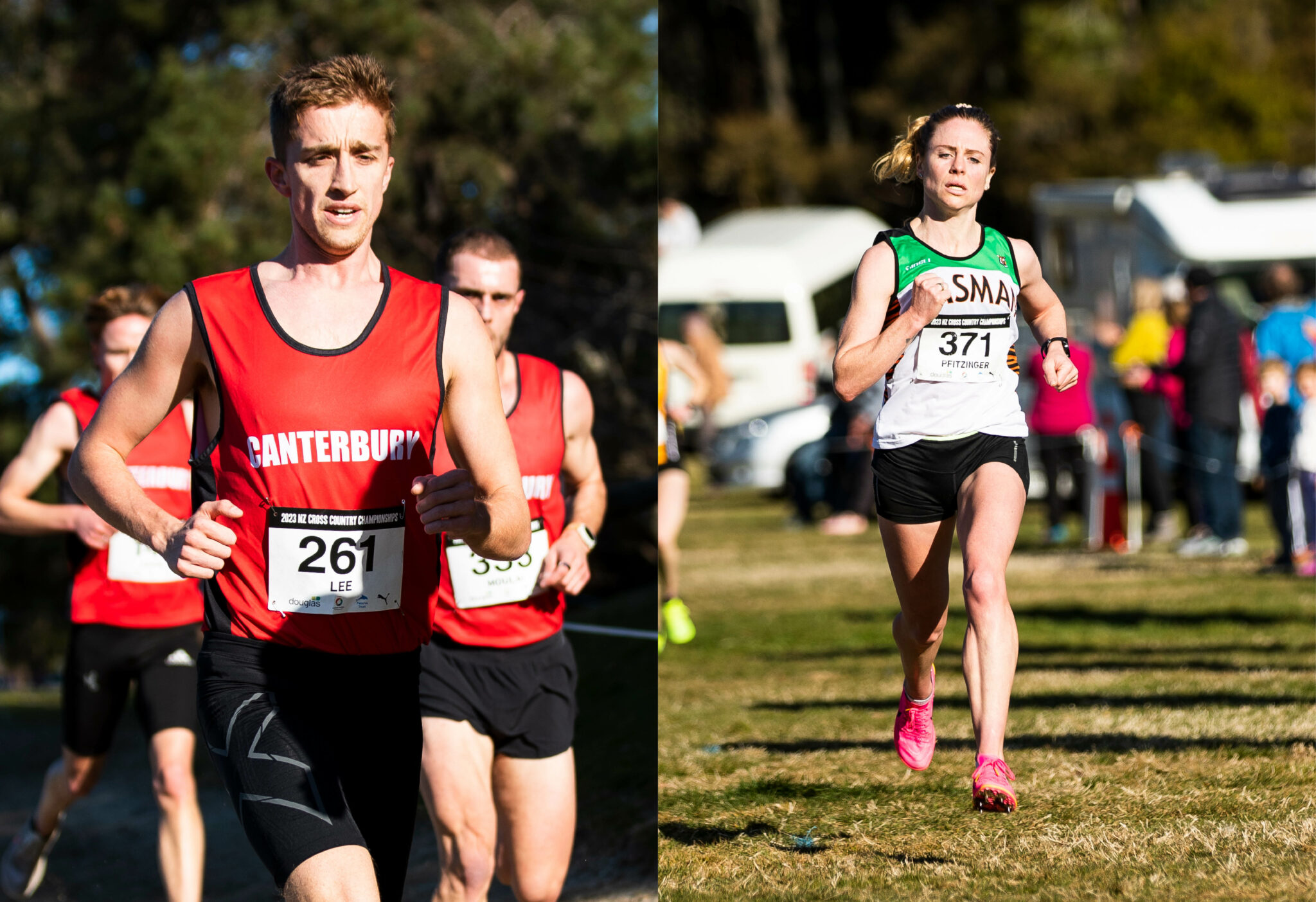News & Updates
Silver linings for Lee and Pfitzinger

David Lee and Annika Pfitzinger both claimed heartwarming silver medals at the New Zealand Cross Country Champs.
The two recently minted New Zealand Cross Country senior silver medalists – David Lee and Annika Pfitzinger – both claimed heartwarming podiums at Spa Thermal Park last weekend. David earned his richly deserved medal after a prolonged period away from the sport and Annika emerged from the gloom of a lengthy period suffering the debilitating effects of Chronic Fatigue Syndrome to land her spot on the dais in Taupo. We find out more of their stories.
David Lee
Unfit and “raising a sweat” after climbing the stairs, David Lee knew something had to change.
Aged 22 at the time the Aucklander had been a gifted young runner, a winner of national U12 and U14 cross country titles and a junior boys’ New Zealand Secondary Schools Championships winner.
Losing his passion for running, exacerbated by growing pains, he quit the sport at 16.
Yet it was that moment climbing the stairs in 2018 which triggered a thought that he desperately needed to improve his fitness – so he re-engaged with running and entered the Round the Bays in Auckland.
“I split a 5km in 18:48, which was the kind of time I could run at the age of 11,” explains David. “I thought, what is wrong with me? Another day I was out for a jog and Peter Wheeler (the 2018 New Zealand 3000m champion) ran past me like I was standing still. That’s when I decided to go back to Pakuranga AC. I started training again, lost a lot of weight and slowly started to get back into racing.”
Given his running gifts, it did not take long to return to a high level. In his first year back, he shed 18kg and placed 11th at the 2019 New Zealand Cross Country Championships in Upper Hutt. He acknowledged he finished nearly two minutes behind gold medallist Cameron Graves, but he added: “I beat some people that day I knew were good runners.”
Moving to a new coach, Vaughan Craddock, David continued to improve. After suffering a couple of stress fractures he rebuilt his training under Vaughan and continued to show signs of improvement after placing a handy sixth at the 2021 New Zealand Cross Country Championships in Dunedin.
But, arguably, the most significant moment in his athletics renaissance arrived when in early 2022 he took the decision to relocate from his native Auckland and head down south to Christchurch. Keen to try a new city and lifestyle, he was also attracted by the vibrant running scene in the city.
“It was unreal to see and very inspiring,” added David of the strong running culture in the Garden City. “I’m getting the chance to train with some of the best talent in the country with the likes of Cam Avery, Connor Melton – who I live with – Will Little, Matthew Taylor, Russell Green and Tom Moulai. There are also athletes such as Andy Good, Oska Inkster-Baynes and Harry Ewing that we link up with.
“Training down here has completely exceeded my expectations. We all know each other’s goals. Running is seen as a solo sport but we have a group mentality and we have set up a great team environment.”
David enjoyed a satisfying track season setting PB’s for the 800m (1:52.63) and 3000m (8:12.95) – describing his efforts as “a step in the right direction.”
More recently he has also switched to be coached by octogenarian Sam McLean and the elixir is clearly working. In recent months he has put in a positive training block and leading into the New Zealand Cross Country and Relay Championships his personal expectations soared.
“Initially I had hoped for a top five but as the event got closer, I thought about a top three,” he explains. “I train with Cam, so I get a good measure of where I’m at. I knew Cam would need a bad day if I was to win but I thought I could get second place.”
His expectations were to become reality when on a sun-bathed day at Spa Thermal Park he completed the 10km endurance test in 31:17 to finish a comfortable second behind Avery, his Christchurch-based training partner. It was an outstanding performance by David to take a first senior medal and a special moment for the manufacturing planner.
“It felt like a long time coming,” explains David, who hopes to win a spot on the New Zealand team for the 2024 World Cross Country Championships in Croatia. “My last medal at a national level was 13 years ago. It reminded me of that same kind of inner-focus I experienced as a kid when I could just execute a plan how I planned. Everything finally clicked.
“Looking back to the 21-year-old me, if you had said I would be running and winning nationals medals I would never have believed it.”
Annika Pfitzinger
Shedding tears of joy moments after winning a silver medal at the New Zealand Cross Country Championships in Taupo, Annika Pfitzinger provided one of the most heartwarming moments of a compelling weekend of cross country action.
After battling Chronic Fatigue Syndrome which threatened to terminate her career it is easy to understand the emotional reaction of the 30-year-old athlete to her podium success.
First diagnosed with the condition in 2018 for several years she often found the simple act of climbing off a couch a desperate struggle. Blinding headaches and fogginess were common and running during this challenging period seemed a remote prospect.
So, for Annika to secure a first senior women’s national cross medal since winning silver ten years earlier understandably provided a moment of unbridled joy for the Nelson-based athlete.
“It has been a really rough past five years, so for me to win silver validates why I’ve stuck with the sport, when probably a smart person would have said no,” explains Annika.
The daughter of 1988 New Zealand Olympic 3000m runner Christine and Peter, the two-time US Olympic marathon runner, Annika first questioned her health after moving down to sea level for the Beach to Beacon 10km road race in Maine following a training stint in Boulder, Colorado.
“I felt awful, and I had nothing in the tank,” she explains. “I tried to regroup for the Falmouth 10km road race in Massachusetts two weeks later, but I felt dizzy and had to pull out of the race.”
Bereft of energy and suffering crippling headaches she continued to struggle but only after her return home to New Zealand – around six months after first suffering symptoms – was she diagnosed with Chronic Fatigue Syndrome.
With no cure or no way of knowing when the symptoms would clear, it offered little reassurance to the promising young athlete who recalls one low moment with clarity.
“I’d long since stopped running and I remember walking five minutes down to the beach for a swim with Julian (Matthews, her partner and 2016 Rio Olympic 1500m runner), and my dad. By the time I got down there I was exhausted. I was suffering pounding headaches and I lay on the rocks. I didn’t even know if I could make the walk back.”
For the next couple of years her life followed the same pattern. Feeling constantly fatigued she had to be very careful not to overexert herself. The condition triggered anxiety and she put all thoughts of running to the back of her mind.
“I had to let that go because it ended up being detrimental to my recovery,” she said.
Yet two years of “feeling bad” she gradually felt like she turned a corner. The fatigue slowly started to lift. She could start to summon up the energy to go for a jog and over time the symptoms eased.
After a few false starts from 2022 she started to train more regularly, although still in an ad-hoc fashion. Twelve months ago, she returned competitively and was pleasantly surprised to place eighth in the senior women’s race at the New Zealand Cross Country Championships in Taupo.
A lengthy trip overseas coupled with Covid stunted her running return but in January this year, under the training regime of her coach, Chris Pilone, she returned once more to structured training. In Wellington at the Jennian Homes New Zealand Track & Field Championships in March she ran a solid 17:17.78 for seventh in the 5000m. The following month she was then lifted by running the second quickest half marathon of her career in Christchurch, clocking 1:16:43.
Consistently training at around 90km a week the Digital Media Manager and running coach then turned her attention to the New Zealand Cross Country Championships, where she performed spectacularly to secure silver with a stunning late charge.
“It was an amazing race, so exciting,” recalls Annika. “Going into that final lap there was six or seven of us within striking distance. It was a brutal race, and from the previous year I knew how much this course hurt.
“Lisa Cross (the 2022 senior women’s champion, who earlier that day had won the women’s masters race) needs to get a mention. She was talking to me during the race and supporting others, she was everyone’s cheerleader. She helped get me through the harder parts of the race. I remember hammering that final hill by the playground. I gained a bit of momentum on the last lap, passing Katrina (Andrew) with about 500m to go to move into third. I was then running scared on the flat section, and it was only with about 150m to go I moved ahead of Sarah (Drought) into second.”
In the immediate wake of her podium finish tears were shed, hugs were shared, and tentative future goals could include the 2024 World Cross Country Championships and Gold Coast Half Marathon.
There is always the possibility of a relapse and for symptoms to return but she can now at least look forward with confidence for the future.
“It has been a tough last five years, but I finally feel like myself again now when I run.”
